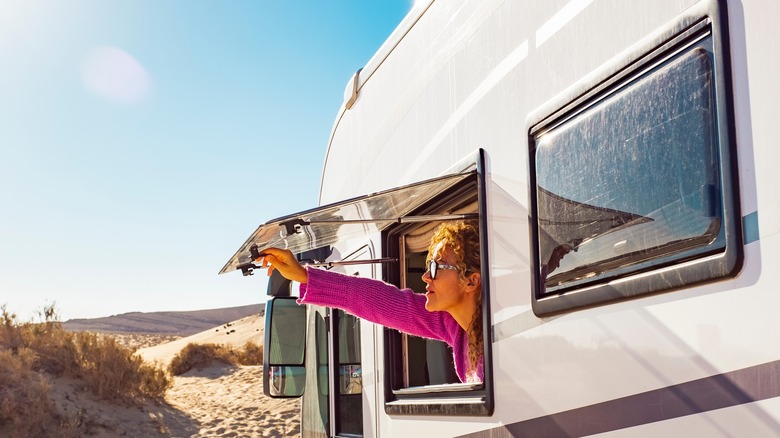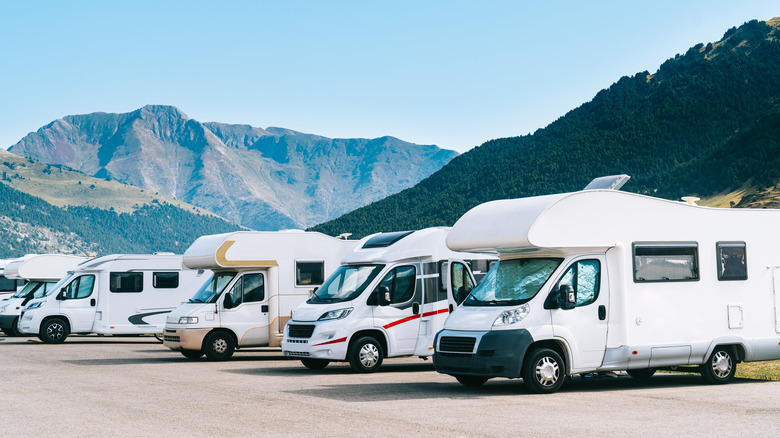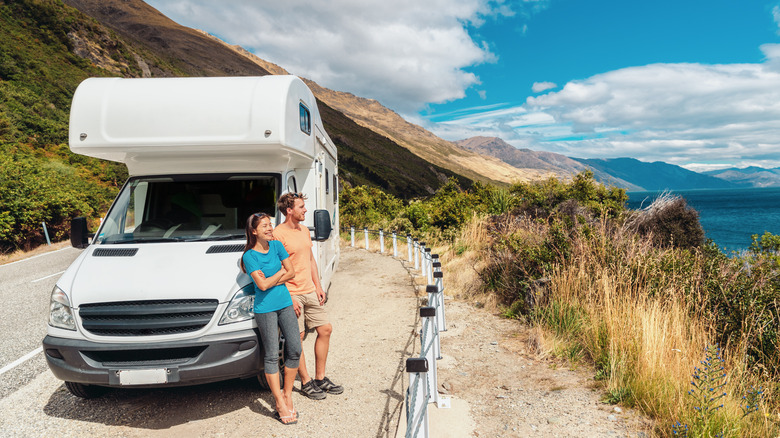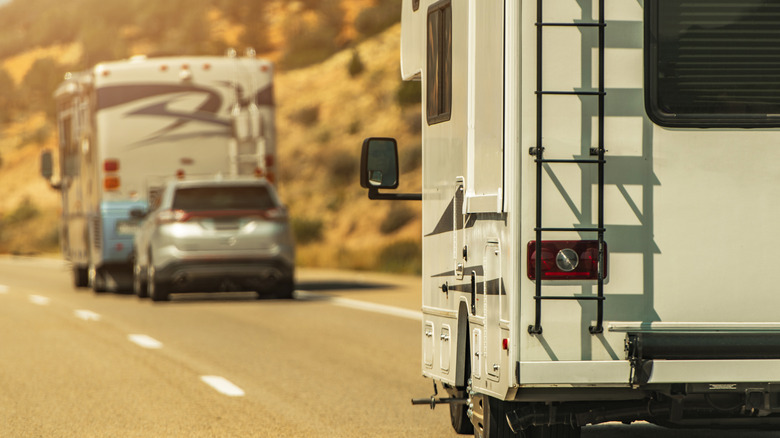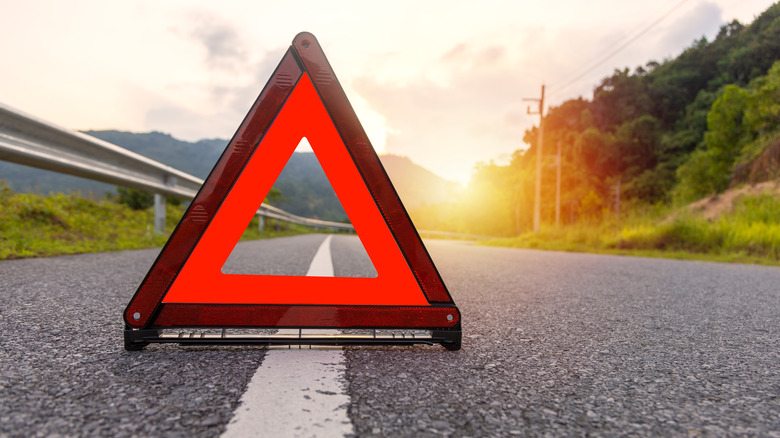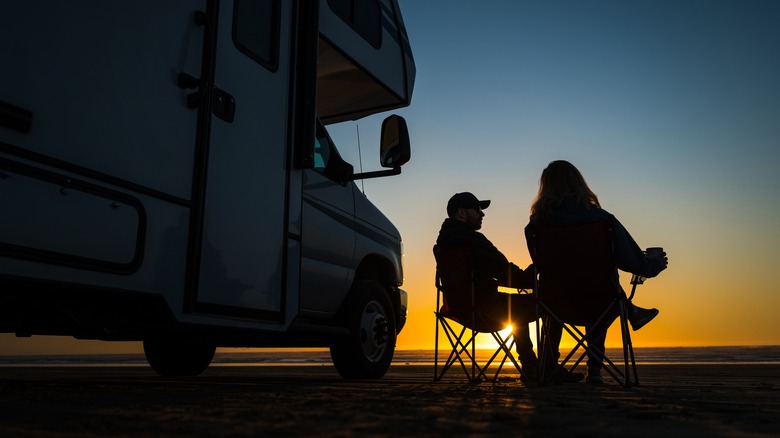What To Know Before Renting An RV For A Road Trip
Road trips are probably one of the best ways to travel around the U.S. and Canada. They allow you to visit small towns you may never have crossed through had you flown to your destination and you can see all the amazing nature these countries have to offer at your own pace. One of the quintessential road-tripping vehicles for both nature lovers and the outdoorsy-curious are rented RVs. These allow you to try out camping without committing to sleeping in a tent or dropping major bank on a luxury item.
But there are some things you need to know before you rent, such as safety guidelines, where you can drive and park it, what to do when things go wrong, and how to generally prevent that from happening in the first place. It can seem scary to hop in the driver's seat of such a large vehicle for the first time. However, if you're armed with the right knowledge, you'll be right as rain.
Things you need before you rent an RV
While you might find it intimidating to drive an RV (after all, they are quite a bit larger than your typical Honda Civic-sized sedan), you don't actually need any special license, endorsements, or classes to drive one. As long as the RV is 40 ft or under, you can rest assured that all you need is a valid driver's license and some confidence!
While you don't need a special license, it's good to learn a bit about the different types of RVs you have to choose from. There are motorhomes which are motorized vehicles equipped with a living space inside, usually including a kitchen, a bathroom, a living room/eating space, and a bedroom. These are classed into three types, Class A, B, and C. Class A is the largest and usually most expensive class of motorhomes. Class B are vans, suited for those looking to try "van life." Finally, Class C is somewhere in between the two, combining the comfort of a Class-A motorhome with the compactness of Class-B vans.
There are also towable campers — also known as travel trailers, fifth-wheelers, or pop-up campers — which have the same amenities as a motorhome but instead must be attached to a vehicle to be towed around. These are usually pick-up trucks or SUVs that are rated as safe to tow.
Where you can park your RV
Now that you've decided on what kind of RV you want, it's time to figure out where you can take this thing and park it. Unfortunately, while the highways that run through this nation's national parks and coastal regions have so many amazing spots where you'd just love to pull over and claim a little scenic view, there are some rules you need to know. For many states and cities, you will need to look up the specific local laws and regulations because they are often different. For the most part, you can assume that parking on a residential street without a permit is probably a no-no. Rules for parking overnight at a rest area are also on a state-by-state basis. Some have time limits of up to 10 or 24 hours or explicitly state there is no overnight camping allowed, full-stop.
If you're really in desperate need of a place to park and you're near civilization, you might want to inquire with the local Walmart. There are many that allow RVs to park overnight though some larger cities may have zoning ordinances that prevent this, so be sure to do your research or just ask the staff.
Safety guidelines for driving
Now, while you don't need a special license or classes to drive an RV, it is good to keep in mind that this isn't like driving your typical car or truck. An RV is much larger than most other vehicles on the road and therefore needs to be driven with a lot of care. This is because of a few reasons.
One, an RV is much larger and heavier than any typical vehicle, which means it will take longer for you to come to a full stop when you press on the brakes. So, always drive in the slow lane on the right-hand side of the freeway or highway and leave a good chunk of distance — about 400 feet — between your front end and the car in front of you. That's a lot more than your usual two or three car lengths. With larger vehicles also comes larger blind spots. So, when changing lanes, merging, or exiting, double-check your blind spots.
Overall, you just want to take things a bit slower with an RV. Everything from parking, to driving, to resting. Driving an RV can be stressful, but if you relax and take your time, things will go a lot smoother. Also, be sure to take lots of rest stops along the way — especially if you are the only one driving — to prevent fatigue, get some movement in, and take in the local scenery.
What to do when things go wrong
You can do everything right, and things can go still go haywire! That's just life. In advance of your trip, make sure to ask the rental company for the best number to call in case of an emergency. Many RV rental companies will offer roadside assistance in addition to the price of the rental. It would be a good idea to purchase this in advance but always read the fine print.
To avoid issues on the road, every single time you're about to drive, you'll want to do a little perimeter check and make sure your tires are okay. Check that you have enough fuel for your trip by planning out your route in advance (or at least for the day), and when you'll need to fuel up next so you're never left stranded.
If the worst happens anyways and you're stranded somewhere, either call the number provided by the rental company for roadside assistance. You can also call AAA, which offers 24/7 roadside assistance and towing, but you'll have to sign up for their membership over the phone.
If you are stuck on the side of a road waiting Your RV should come equipped with at least three orange triangles, flares, or cones which you'll need to set up at 10, 100, and 200 feet behind your vehicle to warn oncoming traffic. Unless you smell gas or propane, stay in the vehicle with your seatbelt on and wait for assistance.
General maintenance and campground etiquette
Renting an RV is incredibly fun, but yes, there are lots of rules and regulations you have to abide by to stay on the right side of the law and be safe. Additionally, there's some not-so-fun maintenance and a few unspoken rules you'll want to be aware of.
While the vehicle is in your possession, you might need to deal with your holding tanks at some point. In most RVs, there is a "gray" tank that holds water from the sinks and showers and a "black" tank which is anything flushed down the toilet ... yeah, it's gross. Some companies will offer to empty your tanks for you at the end of your trip for an additional fee. If you want to do it yourself, ask someone at the rental facility to show you where the hoses are and how to do it. When you need to empty, find a dump station with sanidump.com.
Besides dealing with waste, you'll also want to be aware of some unwritten campground rules. One, don't park right next to another RV/camper. It's great that you want to make friends but leave some space. Two, don't leave your outside lights on all night. Three, generally try not to make lots of noise with music or partying late at night. Four, regardless of what it is, don't smoke where other people can smell it. In summary, just be mindful of other people who are there to enjoy nature, relax, and unwind!
